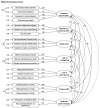Coping in Limbo? The Moderating Role of Coping Strategies in the Relationship between Post-Migration Stress and Well-Being during the Asylum-Seeking Process - PubMed (original) (raw)
Coping in Limbo? The Moderating Role of Coping Strategies in the Relationship between Post-Migration Stress and Well-Being during the Asylum-Seeking Process
Øivind Solberg et al. Int J Environ Res Public Health. 2021.
Abstract
Asylum seekers are faced with high levels of post-migratory stress due to uncertainty and uncontrollability of the application process, resulting in higher levels of mental health problems. Little is known about the coping strategies utilized by asylum seekers in this context. Structural equation modeling and the stepwise modeling approach were utilized on cross-sectional data from a cohort of asylum seekers in Sweden (N = 455) to examine whether adaptive coping in the form of problem-focused and cognitive-based coping would buffer the impact of post-migratory stressors by moderating the relationship between the stressors and well-being. Fit indices showed good to excellent fit of the final model that regressed well-being on selected post-migratory stressors and coping (CFI = 0.964, RMSEA = 0.043 (90% CI = 0.035-0.051), SRMR = 0.044). Well-being was negatively and significantly regressed on both perceived discrimination (B = -0.42, SE = 0.11, p < 0.001) and distressing family conflicts (B = -0.16, SE = 0.07, p = 0.037), and positively and significantly regressed on cognitive restructuring (B = 0.71, SE = 0.33, p = 0.030). There was, however, no evidence that coping strategies modified the adverse associations between the two post-migratory stressors and well-being. Interventions and policies should prioritize improving contextual factors inherent in the asylum-seeking process in order to reduce stress and enable coping.
Keywords: asylum seekers; coping; family conflicts; mental well-being; perceived discrimination; stressors.
Conflict of interest statement
The authors declare no conflict of interest.
Figures
Figure 1
Full structural equation measurement models in the first step of the Structural Equation Model. Panel (a) shows the final measurement model for post-migration stressors; panel (b) the model for well-being; and panel (c) the model for coping. The displayed estimates are standardized coefficients (ß).
Figure 1
Full structural equation measurement models in the first step of the Structural Equation Model. Panel (a) shows the final measurement model for post-migration stressors; panel (b) the model for well-being; and panel (c) the model for coping. The displayed estimates are standardized coefficients (ß).
Figure 2
Full structural equation model of well-being regressed on post-migration stressors and coping strategies. The displayed estimates for regression weights are unstandardized (B) with robust standard error in parentheses. Significant weights are indicated by solid-line arrows. Dashed-line arrows indicate nonsignificant regression weights. The weight estimates that are significant are in bold.
Similar articles
- Exploring Social and Financial Hardship, Mental Health Problems and the Role of Social Support in Asylum Seekers Using Structural Equation Modelling.
Sengoelge M, Solberg Ø, Nissen A, Saboonchi F. Sengoelge M, et al. Int J Environ Res Public Health. 2020 Sep 23;17(19):6948. doi: 10.3390/ijerph17196948. Int J Environ Res Public Health. 2020. PMID: 32977521 Free PMC article. - Asylum-seekers' psychosocial situation: A diathesis for post-migratory stress and mental health disorders?
Solberg Ø, Vaez M, Johnson-Singh CM, Saboonchi F. Solberg Ø, et al. J Psychosom Res. 2020 Mar;130:109914. doi: 10.1016/j.jpsychores.2019.109914. Epub 2019 Dec 27. J Psychosom Res. 2020. PMID: 31935528 - Problems faced by Syrian refugees and asylum seekers in Switzerland.
Kiselev N, Pfaltz M, Schick M, Bird M, Pernille H, Sijbrandij M, de Graaff AM, Schnyder U, Morina N. Kiselev N, et al. Swiss Med Wkly. 2020 Oct 26;150:w20381. doi: 10.4414/smw.2020.20381. eCollection 2020 Oct 19. Swiss Med Wkly. 2020. PMID: 33105021 - The Relationship Between Post-Migration Stress and Psychological Disorders in Refugees and Asylum Seekers.
Li SS, Liddell BJ, Nickerson A. Li SS, et al. Curr Psychiatry Rep. 2016 Sep;18(9):82. doi: 10.1007/s11920-016-0723-0. Curr Psychiatry Rep. 2016. PMID: 27436307 Review. - Mental health interventions for traumatized asylum seekers and refugees: What do we know about their efficacy?
Slobodin O, de Jong JT. Slobodin O, et al. Int J Soc Psychiatry. 2015 Feb;61(1):17-26. doi: 10.1177/0020764014535752. Epub 2014 May 27. Int J Soc Psychiatry. 2015. PMID: 24869847 Review.
Cited by
- Coping styles in refugees with PTSD: Results from a randomized trial comparing EMDR therapy and stabilization.
van Heemstra H, van der Aa N, Mooren T, Medema D, Vink G, Knipscheer J, Moradi A, Kleber R, Ter Heide JJ. van Heemstra H, et al. PLoS One. 2024 Sep 16;19(9):e0310093. doi: 10.1371/journal.pone.0310093. eCollection 2024. PLoS One. 2024. PMID: 39283836 Free PMC article. Clinical Trial. - Exploring Trauma- and Violence-Informed Pregnancy Care for Karen Women of Refugee Background: A Community-Based Participatory Study.
Toke S, Correa-Velez I, Riggs E. Toke S, et al. Int J Environ Res Public Health. 2024 Feb 22;21(3):254. doi: 10.3390/ijerph21030254. Int J Environ Res Public Health. 2024. PMID: 38541256 Free PMC article. - Factors Contributing to Resilience Among First Generation Migrants, Refugees and Asylum Seekers: A Systematic Review.
Lindert J, Samkange-Zeeb F, Jakubauskiene M, Bain PA, Mollica R. Lindert J, et al. Int J Public Health. 2023 Dec 11;68:1606406. doi: 10.3389/ijph.2023.1606406. eCollection 2023. Int J Public Health. 2023. PMID: 38146483 Free PMC article. Review. - Post-migration stressors, mental health and well-being in resettled refugees from Syria: Do individuals' coping strategies matter?
Solberg Ø, Nissen A, Saboonchi F. Solberg Ø, et al. Confl Health. 2023 Dec 20;17(1):60. doi: 10.1186/s13031-023-00556-3. Confl Health. 2023. PMID: 38124118 Free PMC article. - Life and mental health in limbo of the Ukraine war: How can helpers assist civilians, asylum seekers and refugees affected by the war?
Anjum G, Aziz M, Hamid HK. Anjum G, et al. Front Psychol. 2023 Feb 17;14:1129299. doi: 10.3389/fpsyg.2023.1129299. eCollection 2023. Front Psychol. 2023. PMID: 36874809 Free PMC article. Review.
References
Publication types
MeSH terms
LinkOut - more resources
Full Text Sources
Other Literature Sources
Miscellaneous

